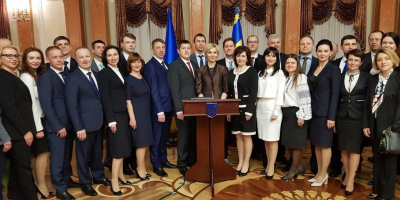
When asked if corruption is one of the major challenges facing Ukraine today, the three judges of the recently established High Anti-Corruption Court (HACC) interviewed by IDLO were unanimous in their answers. The HACC is due to begin operations in September 2019. In the following interview excerpts, judges Lesya Fedorak, Oleksiy Kravchuk and Yevgen Kruk explain why and how they think the HACC can deliver justice more efficiently.
These interviews have been edited for length and clarity.
Do you think corruption is one of the major challenges that Ukraine faces today? Why?
Lesya Fedorak: Ukraine’s performance on the [Transparency International] Corruption Perceptions Index has improved in recent years. Corruption is now among the top three problems of concern to Ukrainians. At the same time, only receiving a bribe is considered corruption and a crime in the consciousness of an ordinary citizen, while giving a bribe is not. Such a one-sided understanding of corruption shows how deeply this phenomenon has penetrated Ukrainians’ consciousness. However, while every citizen of Ukraine realizes that it is necessary to fight corruption in our country, no one wants to start with themselves. And citizens fail to realize that such a phenomenon deprives them of multiple opportunities on a daily basis: investments do not enter Ukraine and, as a consequence, new jobs are not created. Therefore, the fight against corruption is a key challenge faced by Ukraine.
Oleksiy Kravchuk: The fight against corruption is a priority task for Ukraine due to the high prevalence of this phenomenon at various levels: the population’s low trust in public bodies of all branches of power; and, at times, certain communities’ high tolerance for corruption. Hence, it is important for Ukraine to not only create law enforcement bodies and a specialized court for top-level corruption cases, but also to nurture a comprehensive anti-corruption mindset – in educational institutions, the mass media and other bodies – and comply with and demonstrate high standards of integrity from representatives and authorities.
Yevgen Kruk: It is undeniable that the elimination of corruption is among the most important tasks faced by modern Ukraine. Firstly, society is tired of top-ranking officials robbing the country without being punished, while common citizens continue to suffer. Secondly, it is impossible to build a strong economy, which is the driving force of progress and the foundation of real improvements, without a really effective judiciary system. Thirdly, the international community has been expecting real action from Ukraine against corruption for a long time. However, nowadays the task of the country is not to fight this despicable phenomenon, but to eliminate it. The HACC is one of the significant links in this process and we will do everything possible to ensure that Ukraine has a decent place in the international anti-corruption community.
How do you evaluate the role of international partners in establishing the High Anti-Corruption Court?
Fedorak: The engagement of international experts has led to the incorporation of international experience in the competition for the position of HACC judges. A high level of professionalism and a diligent approach to the evaluation of candidates has ensured a transparent and quality selection of judges. As a result, there is a high level of trust from society in the selection process, and a significant vote of confidence in the Court. This has put the Court in a more beneficial position compared to other courts in the country and has showed real and effective progress in the fight against corruption. Personally, I would not have applied to participate in the competition if the international experts had not been involved.
Kravchuk: International partners play a highly significant role in the establishment of the court. Thanks to their joint support the Law on the High Anti-Corruption Court was developed and adopted, and there was a selection process for candidates to become court members.
Kruk: The participation of the Public Council of International Experts has been key to the competition. It is composed of six foreign, recognized specialists with impeccable reputations and extensive experience in cases related to the fight against corruption. They have been recommended by international organizations with which Ukraine has been cooperating in prevention and action against corruption. It should be noted that this approach – whereby Ukraine has allowed foreigners to directly influence the formation of a judicial body – is an extraordinary one.
What do you think may enable the High Anti-Corruption Court to deliver justice more efficiently and professionally than non-specialized courts do?
Fedorak: A limited jurisdiction and clear specialization would allow the Court to focus on these cases specifically and dedicate sufficient time to study materials and make considerations within a reasonable timeframe. Limited specialization and guaranteed independence would become a ‘pillar’ on which the HACC may confidently be based while delivering justice on extremely complex corruption cases.
Kravchuk: The objectives and specific features of the HACC as a specialized anti-corruption court include effectiveness, professionalism, and integrity. Effectiveness means that, taking into account its limited jurisdiction (according to which it only handles top-level corruption cases), the court would consider cases in a timely manner, which would demonstrate the readiness and capability of the public authorities. Professionalism means specialization and ensuring high standards in accordance with the rule of law. While considering corruption cases, HACC judges will become specialists on these particular cases, which increases effectiveness. The selection of judges with the participation of international experts means the Court comprises professionals with strong reputational qualities who deliver justice professionally and independently, without external influence.
Kruk: Specialized courts can help promote increased effectiveness of justice delivery, often thanks to well-established procedures, as well as higher quality and more consistent decisions in complex areas of law.
IDLO is implementing a project that aims to contribute to strengthening the capacity and integrity of Ukraine’s High Anti-Corruption Court, and in turn improve public trust in the country’s anti-corruption efforts.
Photo ©: President of Ukraine official website

